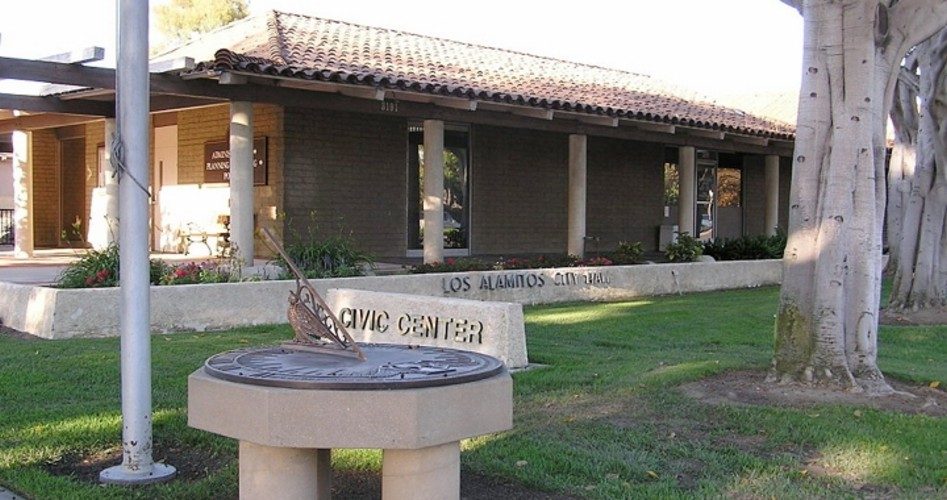
The city council of Los Alamitos, California, (city hall shown) is scheduled to vote on March 19 on an ordinance that calls for exempting itself from SB 54, also known as the California Values Act. SB 54, signed into law by Governor Jerry Brown last October 5, went into effect on January 1 and prohibits state and local agencies from enforcing immigration laws or from working with immigration enforcement agencies.
The proposed city ordinance reads in part that the state law “may be in direct conflict with federal laws and the Constitution of the United States.”
The Orange County Register quoted further from the ordinance, which states that the council members have taken an oath to defend the U.S. Constitution and that the council “finds that it is impossible to honor our oath to support and defend the Constitution of the United States” while complying with the California Values Act.
The Register quoted Los Alamitos Mayor Troy Edgar, who said he wants to discuss the proposal, which was introduced by Councilman Warren Kusumoto, and is tentatively in favor of it. “The state had overstepped its boundary” in passing the sanctuary state law, Edgar said.
And one community activist quoted by the Washington Times praised the proposed ordinance and criticized the California state law as a relic of the 1850s.
“Everyone holding elective office takes the same oath to uphold the laws to protect and defend the Constitution of the United States. It doesn’t say ‘unless the state legislature decides otherwise,’” Art DeBolt said. “I do believe somewhere in our history, we fought a war to prevent states from ignoring the law of the land and preserving the union.”
{modulepos inner_text_ad}
While DeBolt’s support for the proposed Los Alamitos ordinance and the Constitution is praiseworthy, his argument that the Civil War established that states must obey all federal law without question is flawed. The states, in fact, do have a remedy for resisting congressional acts or presidential decrees that violate the Constitution. It is called nullification. In the Kentucky Resolution of 1799, Thomas Jefferson called nullification the “rightful remedy” for any and all unconstitutional acts of the federal government.
The federal government may exercise only those powers that were delegated to it. This is made clear by the 10th Amendment: “The powers not delegated to the United States by the Constitution, nor prohibited by it to the States, are reserved to the States respectively, or to the people.” Nullification, therefore, recognizes each state’s reserved power to nullify, or invalidate, any federal measure that a state deems unconstitutional.
However, does the right of nullification allow states to nullify federal immigration laws? An article published by the Heritage Foundation last year entitled “Sanctuary Cities? That’s a Constitutional ‘Hell No’” explored the question of whether or not nullification applies to the dispute over sanctuary cities. In that article, which originally appeared in Conservative Review, author Hans A. von Spakovsky wrote:
While there are many areas over which the states and the federal government share responsibility — or where the Tenth Amendment gives responsibility to the states — immigration is not one of them. Section 8 of Article I gives Congress exclusive authority to “establish a uniform Rule of Naturalization,” just as Section 8 gives Congress the exclusive authority to establish and collect all “Imposts and Excises” or tariffs. The states have no authority in these areas at all. They can no more dispute the immigration rules established by Congress than they could dispute the tariffs imposed by Congress back in 1832….
When it comes to immigration and the entry of aliens into the U.S., Congress delegated to the president the extremely broad authority under 8 U.S.C. §1182 (f) to suspend the entry of any aliens or class of aliens into the U.S. if he believes it “would be detrimental to the interests of the United States.” As five dissenting judges at the Ninth Circuit Court of Appeals recently pointed out, there are a long series of decisions by the U.S. Supreme Court upholding the authority of prior presidents under this provision and severely limiting the ability of the courts to review the president’s decision.
Therefore, while the constitutionalist zealously defends the right of the states to nullify unconstitutional federal laws, von Spakovsky makes a good case that immigration laws are not among these.
The Trump administration is currently engaged in an ongoing battle with so-called sanctuary cities (and California, which through SB 54 has declared itself to be a “sanctuary state”) and has used various means to force these jurisdictions to comply with ICE’s detainer requests, which ask local law enforcement to hold illegal aliens in their custody until immigration agents can apprehend them. In a 2016 article published by the Washington Times, “Are sanctuary cities legal?” Andrew Napolitano, a former judge of the Superior Court of New Jersey, presented the question: “Are state and local governments required to help the feds enforce federal law?” He answered: “No.” In explaining his answer, Napolitano wrote:
Thus the Trump dilemma. He must follow the Constitution, or the courts will enjoin him as they have his predecessor. He cannot use a stick to bend the governments of sanctuary cities to his will, but he can use a carrot. He can ask Congress for legislative grants of funds to cities conditioned upon their compliance with certain federal immigration laws.
Los Alamitos, however, is considering a unique proposal. Instead of declaring itself to be a sanctuary city, it wants to become a non-sanctuary city within a sanctuary state. While we will not know how this will play out until after this evening’s city council vote followed by how the state of California will react to that vote if the proposal is passed, it does raise interesting possibilities. For one thing, if the Trump administration can ask Congress for funds for cities that comply with federal immigration laws, might not Los Alamitos, if it votes to exempt itself from California’s sanctuary policies, qualify for a federal grant? And if it were successful, might not this encourage other cities in California to follow suit? This is worth following closely.
Photo of Los Alamitos City Hall by Epolk
Related articles:
Trump DOJ Sues California Over Its Immigration and Sanctuary Policies
President Trump Thinking About Pulling ICE Agents Out of California
California to Punish Businesses That Cooperate With Feds on Immigration
Governor Brown Signs Bill to Make California a Sanctuary State
ICE Acting Director: California Sanctuary State Law Will Force “At-large” Arrests
Trump DOJ Demands Documents From “Sanctuary” Jurisdictions
Sessions and DOJ Give Sanctuary Cities “Last Chance” to Comply
Trump, Sessions Increase Pressure on Sanctuary Cities
Sanctuary Cities: an Invitation for Criminals
ICE Acting Director: California Sanctuary State Law Will Force “At-large” Arrests




